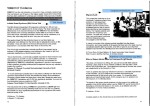Former Visiting Professor Patrick Holford but still Head of Science and Education at Biocare has an enthusiasm for interventions that we wish we might share but, too frequently, when we examine the studies on which he relies, the results do not support his claims or the scope of his optimism.
In a recent newsletter, Patrick Holford was rather excited about a recent study: Randomised controlled trial of food elimination diet based on IgG antibodies for the prevention of migraine like headaches. For reasons that may become clear, he neglected to mention the full title of the paper.
Last month a study published in the Nutrition Journal showed that 85% of people affected by debilitating migraines had their symptoms reduced, and quality of life improved, when their food triggers were discovered and avoided. Having a hidden food allergy is one of five common causes of migraines.
This recent study tested migraine sufferers for food allergy using YorkTest’s FoodScan test. Eighty four of the volunteers were put on their food allergy free diet, while 83 were given a sham ‘allergy’ diet based on fake test results. At the end of four weeks those on the real allergy free diets had had 23% less migraines than those on the sham diet.
You might be a little surprised that Holford was quite so excited by this result after 4 weeks of assessment that the newsletter was subject-lined, “Relieve your migraine without painkillers” and headlined, “What’s causing migraines?”. Holfordwatch consulted the original study and can not agree that Holford provides a useful interpretation of its outcome.[1] According to the reported results, it seems as if even the study’s authors might quibble with Holford’s optimism:
The results indicated a small decrease in the number of migraine like headaches over 12 weeks, although this difference was not statistically significant (IRR 1.15 95% CI 0.94 to 1.41, p = 0.18). At the 4 week assessment, use of the ELISA test with subsequent diet elimination advice significantly reduced the number of migraine like headaches (IRR 1.23 95%CI 1.01 to 1.50, p = 0.04). The disability and impact on daily life of migraines were not significantly different between the true and sham diet groups. [Emphasis added.]
There are many other problems with this paper (eg, the participants are effectively self-selected from a group that is pre-disposed to believe that food intolerance influences migraine; there is no clinical verification of the migraine-like headaches description; respected experts in allergy and immunology caution against the notion that Yorktest’s IgG Food Intolerance test is diagnostic of food intolerance or clinically relevant; the number of study drop-outs compromises the power of the study effect). The study lacks scientific rigour to the extent that the only surprise is that a journal reviewer changed his opinion between 1st and 2nd review:
This paper has strong deficiencies in respect to the study design, recruitment, compliance, and no medical control and assessment of the subjects, not meeting the criteria for a scientific paper. Due to the huge amount of uncertainties, also acknowledged by the authors, this paper has no new information to offer and is of limited interest.
Level of interest: Reject as not of sufficient priority to merit publishing in this journal. [1st review]
Such flaws in the design and other areas can not be corrected merely by re-writing yet the reviewer accepts the revisions (eg, the revised title now refers to “migraine-like headaches” rather than “migraine”) and changes the review comment to:
Level of interest: An article whose findings are important to those with closely related research interests. [2nd review]
Recall that the research finding is not, as Holford leads, “[You can relieve] your migraine without painkillers” but that the study revealed that at 12 weeks (the study’s stated primary outcome): “this difference was not statistically significant“. Holford’s account is partial and inaccurate. This is lamentable when one considers that he claims to be a valuable intermediary between the public and the practical reporting of health research. It is unsettling when one considers that there is considerable apprehension that some patients and healthcare providers might be persuaded by such claims to lobby for such ineffective tests and diets to be funded by the NHS despite their lack of clinical relevance or efficacy.
Notes
[1] Holfordwatch notes that Yorktest provided a similarly partial account of the study findings in their September 2011 news items and that the media that ran the Yorktest release on this study did not investigate the findings but reproduced this and other unduly favourable interpretations (the rollcall of shame includes: Metro, Red Online, Top Sante, Women’s Fitness, Women’s Weekly, OK Magazine, Woman’s Weekly, Female First.




